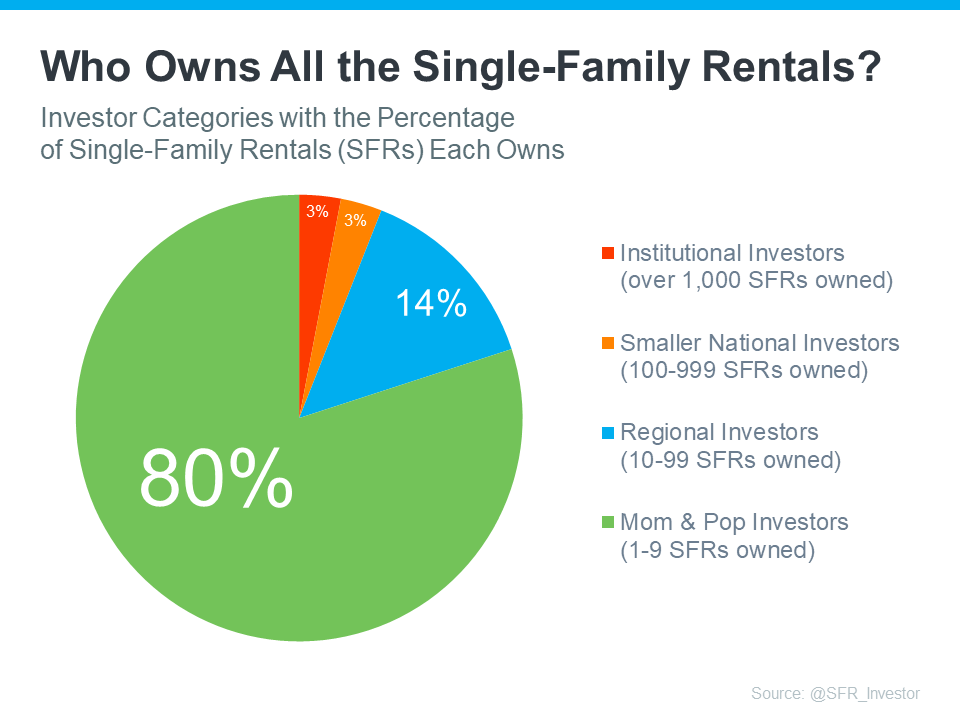
“Are institutional investors, like large Wall Street Firms, really buying up so many homes that the average person can’t find one?“
If you’re thinking about buying a home, you may find yourself interested in the latest real estate headlines so you can have a pulse on all of the things that could impact your decision. If that’s the case, you’ve probably heard mention of investors, and wondered how they’re impacting the housing market right now. That could leave you asking yourself questions like:
- How many homes do investors own?
- Are institutional investors, like large Wall Street Firms, really buying up so many homes that the average person can’t find one?
To answer those questions, here’s the real story of what’s happening based on the data.
Let’s start with establishing how many single-family homes (SFHs) there are and what portion of those are rentals owned by investors. According to SFR Investor, which studies the single-family rental market in the United States, there are eighty-two million single-family homes in this country. But how many of them are actually rentals?
According to data shared in a recent post, sixty-eight million (82.93%) of those homes are owner-occupied – meaning the person who owns the home lives in it. If you subtract that sixty-eight million from the total number of single-family homes (82 million), that leaves just about fourteen million homes left that are single-family rentals (SFRs).
Do institutional investors own all of those remaining fourteen million homes? Not even close. Let’s take it one step further. There are four categories of investors:
- The mom & pop investor who owns between 1-9 SFRs
- The regional investor who owns between 10-99 SFRs
- Smaller national investor who owns between 100-999 SFRs
- The institutional investor who owns over 1,000 SFRs
These categories show that not all investors are large institutional investors. To help convey that even more clearly, here are the percentages of rental homes owned by each type of investor (see chart below):
As you can see in the chart, despite what the news and social media would have you believe, the green shows the vast majority are not owned by large institutional investors. Instead, most are owned by small mom & pop investors, like your friends and neighbors.
What’s actually happening is, that there are people out there, just like you, who believe in homeownership, and they view buying a home (or a second home) as an investment. Maybe they saw an opportunity to buy a second home over the last few years to use it as a rental and generate additional income. Or maybe they just decided to keep their first house rather than sell it when they moved up.
So, don’t believe everything you read or hear about institutional investors. They aren’t buying up all the homes and making it impossible for the average person to buy. That’s just not what the numbers show. Institutional investors are actually the smallest piece of the pie chart.
Bottom Line
While it’s true that institutional investors are a player in the single-family rental marketplace, they’re not buying up all of the houses on the market. If you have other questions about things you’re hearing about the housing market, let’s connect so you have an expert to give you the context you need.
To view original article, visit Keeping Current Matters.
Your House Could Be the #1 Item on a Homebuyer’s List During the Holidays
Each year, homeowners planning to make a move are faced with a decision: sell their house during the holidays or wait.
What Homeowners Want To Know About Selling in Today’s Market
The key to success today is being realistic and working with a trusted real estate advisor.
Mortgage Rates Will Come Down, It’s Just a Matter of Time
As we get through the inflation battle and start to see that coming down, we should expect mortgage rates to follow.
More People Are Finding the Benefits of Multigenerational Households Today
Combining resources with parents and/or siblings may help you achieve the dream of buying and owning a home.
Why It May Be Time To Add Newly Built Homes to Your Search
If you’re willing to work with a trusted agent to consider a newly built home, you may have even more options than you realize.
Home Equity: A Source of Strength for Homeowners Today
If you’re facing difficulties yourself, it can help to understand your options. A real estate professional can help you!








.jpg )



